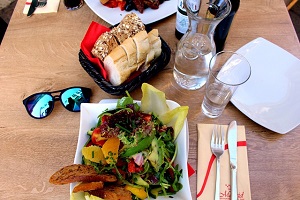Drinking water or other beverages while eating is a common practice for many people, and it is generally considered safe and even recommended in most cases. However, there are a few situations in which it may be advisable to avoid drinking fluids while consuming a meal:
1. Digestive issues
Some individuals with certain digestive disorders, such as gastroesophageal reflux disease (GERD) or irritable bowel syndrome (IBS), may find that drinking fluids during meals exacerbates their symptoms. In these cases, it’s best to avoid consuming large amounts of liquids with food to prevent discomfort and potential reflux.
2. Gastroparesis
Gastroparesis is a condition where the stomach takes longer to empty its contents, leading to delayed digestion. For people with gastroparesis, drinking fluids while eating can further slow down digestion and cause bloating and discomfort.
3. Overeating
Drinking too much liquid during a meal can fill up the stomach faster, leading to a decreased feeling of satiety and potentially encouraging overeating. People who are trying to manage their weight may want to limit liquid intake while eating to avoid consuming excessive calories.
4. Nutrient absorption
Some studies suggest that drinking large amounts of water during meals may dilute the digestive juices in the stomach, potentially affecting the breakdown and absorption of nutrients. However, more research is needed to fully understand the impact of water consumption on nutrient absorption.
5. Choking risk
Elderly individuals or people with certain neurological conditions that impair swallowing (dysphagia) may be at a higher risk of choking if they drink liquids while eating solid foods. In such cases, it’s recommended to take sips of water or other liquids between bites of food rather than during meals.
6. Diabetes management
For individuals with diabetes, timing and portion control of fluid intake can be important for managing blood sugar levels. Drinking large amounts of sugary beverages during a meal can cause rapid spikes in blood glucose. Additionally, for those taking insulin, drinking excessive fluids during a meal might affect the accuracy of insulin dosing.
7. Specific medical conditions
Certain medical conditions or treatments may require adjustments to fluid intake during meals. For instance, people on dialysis or undergoing specific medical treatments may need to follow specific guidelines provided by their healthcare professionals.
It’s essential to remember that individual responses to drinking fluids while eating can vary. Some people may not experience any issues, while others may find it uncomfortable or problematic.
As a general guideline, If you have specific health concerns or dietary requirements, it’s always best to listen to your body and to consult with a healthcare professional or a registered dietitian to determine the most appropriate approach to fluid intake during meals.
Why is it that people choose to drink natural water instead of other beverages?

